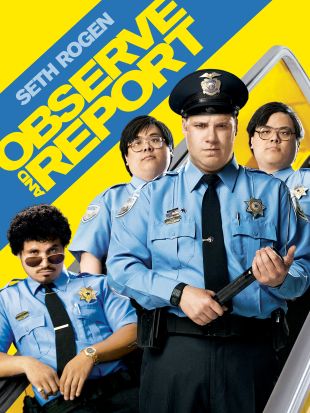
The mall cop comedy Observe and Report combines goofball shenanigans with a torrid loathing for humanity (and with many, many savage beatings). This weird amalgamation definitely has an upside, because it's probably something you've never seen before. But it also has a downside: namely that it's a little bit schizophrenic, and that all the shameless, full-frontal grossness (not to mention actual, full-frontal male nudity) can be really jarring, especially for viewers who go in expecting a potty-mouthed version of Paul Blart.
Of course, making you uncomfortable is kind of the goal, so criticizing the movie for being disturbing is a murky issue at best. It stars Seth Rogen as Ronnie, a deluded mall security guard who spends his days hassling loiterers like he's sniffing out suicide bombers in Fallujah, and his nights watching TV with his very drunk mom. Then, one fine morning, a flasher shows up in the parking lot, exposing himself to a number of women, including makeup-counter vixen Brandi (the always hilarious Anna Faris), whom Ronnie just happens to be in love with. This gives him the perfect chance to act blusteringly heroic (she gets flashed while getting out of her car, but Ronnie nonetheless sets up a perimeter of orange traffic cones around her chair in the department store, where she's describing her ordeal).

It's worth noting that the film takes a fair amount of time setting up this standard-issue "pompous but pathetic hero with delusions of grandeur" premise with all the standard-issue jokes that go with it. Cut to Ronnie ordering his subordinates around with over-the-top lingo out of movies like Commando and Delta Force; cut to slow-motion shots of the mall cop crew, squinting and posing in badass formations that emphasize their dorky self-importance; cut to Ronnie's bombastic antics constantly getting in the way of police detective Harrison (Ray Liotta), who highlights the hero's dumbassery by actually knowing what he's doing. It's all delivered creatively, but it also feels pretty familiar, like something we've seen a million times over except with Jack Black or some SNL alum in the starring role.
But fans of director Jody Hill's first film, The Foot Fist Way, know better than to expect things to stay conventional -- and they seriously don't. As Ronnie's mettle is increasingly tested, and he gets more and more chances to prove that he really is preternaturally talented at his chosen area of obsession (at one point taking down an army of police officers Bruce Lee-style, armed only with a nightstick and the brutal, meat-packing sound effects of human flesh getting pummeled with a blunt object), the story moves further and further from the template laid down by the genre. The jokes get darker (how unconscious does she have to be, exactly, for it to qualify as date rape?), and the narrative jumps all over the place, switching gears so frantically between stylized portrayals of "it's just a movie" logic and gritty depictions of "now we can't escape reasonable consequences" realism that you not only can't tell whether the hero will win out in the end, you really can't tell if he should.

Hill meticulously spends time getting you to root for Ronnie, only to incrementally yank the rug out from under you with revelations that he's crazy, racist, and kind of an asshole. Even though the film continues to frame Ronnie's character along the traditional lines of the flawed-but-lovable hero archetype (the effed-up Don Quixote), it also continues to cross the lines set down by that archetype. One minute, Ronnie is the blustering, saintly fool; the next, he maybe killed a guy. One minute, he's blissfully overconfident, the next, he's suffering the unsettling effects of what is clearly actual mental illness.
Again, this is all part of Hill's plan: he strives for cognitive dissonance, and he definitely gets it. He'll build up your tolerance for how much violence, nastiness, and tragedy you can laugh at, and then he'll throw in an epic shock, so you don't know for certain in the moment whether you're supposed to find it funny or terrible. You'll probably sense a little bit of both, and feel pretty disoriented. This particular state of mind is exactly the intended effect. You're supposed to laugh out loud at the hilarious awfulness of everything, you're supposed to be aghast at the shocking grotesquery of it all, and you're supposed to feel bewildered about the whole thing. Some movies strive to give you that warm, fuzzy feeling, and some strive to make you bawl your eyes out, but Observe and Report strives to make you feel ambivalent, confused, and a little bit dirty, and whether or not you find that enjoyable, it's not something you likely feel very often.
